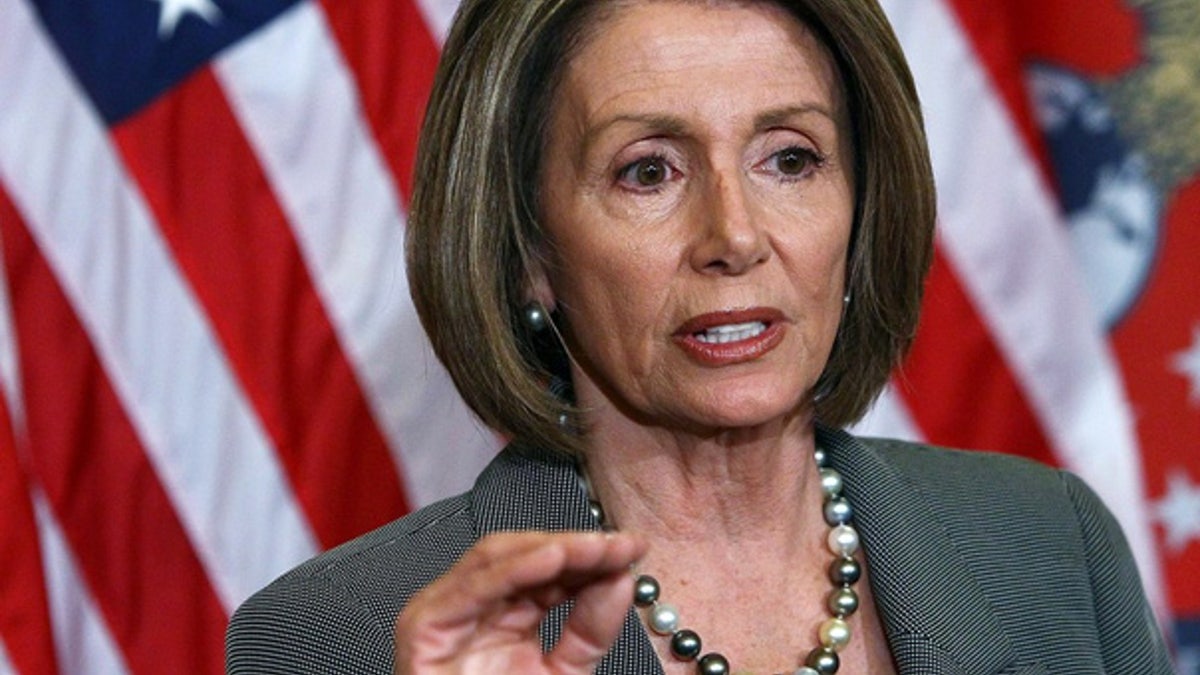
Mar. 4: Speaker of the House Nancy Pelosi answers questions during a press conference at the U.S. Capitol. (AFP)
The White House is pushing to strip out a number of "sweetheart" deals in the Senate bill as Nancy Pelosi said Thursday that Democrats are unlikely to make the March 18 deadline set by President Obama for passage, an indication the House speaker doesn't have the votes to pass it.
Pelosi said "March 18 is an interesting date" as she announced lawmakers are still waiting for a Congressional Budget Office report on the cost of the legislation.
"Our clock starts ticking when we get the final CBO report," Pelosi said. "We don't have the final report yet but we have a pretty good idea of where we are going on it."
The current plan is for the House to approve the Senate-passed bill from late last year, despite serious objections to numerous provisions. Both chambers then would pass a second bill immediately, making changes in the first measure before both could take effect. The second bill would be debated under rules that bar a filibuster, meaning it could clear by majority vote in the Senate without Democrats needing the 60-vote supermajority now beyond their reach.
Pelosi had ordered committee chairmen to postpone their hearings Thursday so lawmakers could finish backroom negotiations.
Democratic leaders insisted a deal is near, despite several unanswered questions, whether it's expanding Medicaid or Medicare, tax-funded abortion service, special kickbacks for resistant lawmakers or the untallied costs.
And in another wrinkle to the debate, Senate Budget Committee Chairman Kent Conrad, D-N.D., told fellow caucus members Thursday that Senate Parliamentarian Alan Frumin had advised him that the House must past the Senate bill and Obama must sign it before the second bill could be passed. That means the House Democrats would have OK'd legislation many of them don't like, relying on faith that adjustments would be made afterward.
White House spokesman Robert Gibbs softened the administration's March 18 deadline, when Obama leaves for Asia.
"If it takes a couple of days extra...we're happy to have it passed then, too," he said Thursday. "Even if he's already gone."
Obama already has moved to eliminate a couple of special deals in the Senate bill that turned off voters when they became public, including extra Medicaid funding for Nebraska -- derided by critics as the "cornhusker kickback" and Medicare coverage for residents of Libby, Mont., who suffer from asbestos-related illnesses because of a now-closed mining operation.
"Not helpful" is how one senior congressional Democratic aide called the effort.
"This is totally not necessary," the aide said. "We're trying to put together a bill, while they're just exposing more sausage-making."
"I mean, give me a break," the aide continued. "This is just grandstanding. We're trying to put together a bill, while the White House plays to the good government crowd."
In its latest report, the CBO estimates that the Senate bill passed Christmas Eve would cost $875 billion, up from its original estimate of $871 billion.
The report, released Thursday, also revised its cost savings of the bill, projecting that the budget deficit would be reduced from 132 billion over 10 years to $118 billion.
But the future spending needed to administer parts of the bill could undermine the deficit reduction, including up to $10 billion for the IRS, up to $20 billion for Health and Human Services and up to $50 billion for "grant programs and other provisions."
Democrats are hoping the provisions being cobbled together stay around $950 billion over 10 years.
Obama, who wanted a House vote before he leaves on a six-day trip to Indonesia, Guam and Australia, has kept up campaign-style appearances designed to fire up public support.
He heads to northeastern Ohio on Monday for an appearance near the hometown of an uninsured cancer patient named Natoma Canfield, whom the president has made a symbol of the need for reform. Canfield had been expected to introduce the president but canceled Wednesday after she fell ill and was taken to a hospital for tests.
It will be Obama's third event on health care in a week. In St. Charles, Mo., on Wednesday, Obama shouted to a crowd: "The time for talk is over. It's time to vote."
Almost every American would be affected by the legislation, which would change the ways people receive and pay for health care, from the most routine checkup to the most expensive, lifesaving treatment.
Critics say the legislation is designed to expand coverage, but will do nothing about increasing care. And Sen. Jon Kyl, R-Ariz., warned Wednesday that mechanism to rescue the bill -- a process called reconciliation that aims to address the budget matters separately from the coverage issues -- is opposed by all 41 Republican senators.
"This is the response to the declaration of war," he told Fox News.
"Nobody likes the bill that is out there now. They are all going fix it, except that they are not going to be able to fix it. That's our point. So they shouldn't vote for a bill that they think is going to get fixed, because it isn't going to get fixed, at least in all of the ways they want it to," Kyl said.
Pelosi and other House Democrats want to include Obama's proposed overhaul of the nation's student loan programs in the second, fix-it health care bill. The measure would require the Education Department to originate all student assistance loans, effectively eliminating a role for banks and other private lenders. That idea has run into opposition from several Senate Democrats.
The Associated Press contributed to this report.




